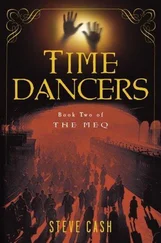At the far end of the great room we walked through wide double doors into the kitchen area, then beyond and through a smaller door into Koki’s apartment. The room stank of stale tobacco and the scent of sardines. He pushed back a curtain in the corner of the room and opened a heavy wooden door reinforced with three iron straps. The door led to a dark stone passageway. There was a flimsy string of electric lights along the wall, but the electricity was out. I found another candle in the room and lit it, using Koki’s candle. He walked ahead of me. The air in the passage became cooler and slightly damp. We took two right turns and passed by three doors, all reinforced in the same manner. At the fourth door, Koki came to a halt. The door was no different from the others except for a long iron key hanging from the wall next to the door. Koki spun around and grinned. “Hello, mister. Yes.”
“Yes,” I said, grinning back, “yes, Koki, yes!” I handed Goya’s skull over to him and said, “Hold this.” Koki’s mouth dropped open, but he nodded his head and began rocking back and forth, holding his candle high in one hand and Goya tight against his chest with the other. I slipped the ancient key off the hook and inserted it in the lock, then turned it once to the right and heard the click. I pushed on the heavy wooden door. The hinges groaned and creaked from the weight. I held up my candle and took a step inside. I could see a Persian rug beneath my feet, but that was all. Then I heard a match being struck and a small bloom of flame flared in the darkness. In its light I saw her sitting on a bed ten feet away and looking up at me. She lit a candle next to the bed, then looked back at me. She wore black cotton pajamas and slippers. Her hair was cropped close to her head, and her skin was as black as her pajamas. She wore no jewelry, but her eyes sparkled in the candlelight like two brilliant green emeralds. In one second I knew in my heart and mind that she was much, much older than all the rest of us. Susheela the Ninth.
“Ta ifi dite ifsaah, dite kaa mabayisa,” she said softly.
I took another step forward. “I’m sorry, but I’m not familiar with your language,” I said. “Do you speak English?”
“Most certainly,” she answered, smiling slightly and reminding me a great deal of Opari, not only in her features, but also in her speech and manner. She rose to greet me. We were exactly the same height. “My words were these,” she said. “ ‘And the light shineth in darkness, and the darkness comprehend it not.’ ”
“My name is Zianno Zezen, Egizahar Meq, through the tribe of Vardules, protectors of the Stone of Dreams, and I have come to take you out of here.” I looked into her intensely green eyes. Inside her gaze there was a deep calm and stillness I had never seen before in anyone’s eyes. I was sure it was this utter and complete serenity within her that had frustrated the Fleur-du-Mal to the breaking point. “I know who you are,” I said, “but what do I call you?”
“Long ago, in my youth, I was called ‘Sheela.’ Would that do?”
I smiled and told her that would do just fine, then I told her we must leave immediately.
“I understand,” she said. She grabbed a few loose items from the table next to her bed, shoved them into side pockets in her pajamas, and reached for a light shawl draped over a chair, but nothing else. She turned to me. “Shall we?”
I paused at the doorway. In the passage Koki was still rocking and holding Goya tight. Behind me, she asked, “Do you know of a secret exit?”
“Not exactly, but I’m pretty sure he does.” I nodded toward Koki.
“Koki?” she asked, raising her eyebrows. “You are depending on Koki?”
“Yes. If I know the Fleur-du-Mal, there is another exit from this level of the shiro , a hidden one, probably dating from when the level was used as a torture chamber and prison. That’s what would have attracted him to the property. I’m betting Koki knows where it is.”
“And you believe Koki will lead us to this exit? He is not capable of such behavior.”
“He is today.” I pulled the door shut and placed the key back on its hook. “Koki,” I said, “show us the way out … the other way.” Koki looked at me and acknowledged me, but didn’t respond. He seemed confused. I reached out and took Goya’s skull from him. I was worried I had scared him and fear was the last thing I wanted him to feel.
Suddenly Susheela the Ninth stepped forward. “Dedoko,” she said quietly. “ Dedoko … kakushigoto … kakushigoto , Koki.”
Koki wiped his chin, pushed his glasses up, and grinned. His stained teeth looked black in the faint light of the candles. “Yes, hello,” he said, and turned around, shuffling away through the darkened passage, not waiting for us.
I glanced at Susheela the Ninth. “I don’t know what you said, but thank you … Sheela.”
She smiled at hearing her childhood name. “I told Koki you wanted the secret exit, and you are welcome … Zianno.”
“Call me Z,” I said, then motioned her ahead of me. “Shall we?”
Koki picked up the pace and we walked by three more doors before the passage came to a T. We took a left and stopped in front of another door, which resembled the others in every way, except that when Koki opened the door there was no bedroom or cell inside. This door led to an iron spiral staircase winding up and disappearing into darkness.
“Yes, hello,” Koki said.
“Hello, yes, Koki!” I replied, glancing up. “Follow me.” I held the candle high. Susheela the Ninth fell in behind me and we started up. After climbing one full revolution, I looked down and noticed Koki still standing at the bottom of the stairs. He hadn’t moved. Then I realized he couldn’t. Climbing up and out of the shiro was too much for him. He had done what he was told, but leaving the shiro was out of the question. Tomorrow he would likely forget that he had helped at all. Tomorrow he would remember nothing about the incident, including Susheela the Ninth and me, and yesterday, for Koki, was inconceivable. He was looking up through the steps of the spiral stairs, watching us. He wiped his chin once. “Good-bye, Koki,” I said. “You play a great game of chess.”
His face widened into his biggest grin and he nodded his head, however, I’m not sure he comprehended a word. “Yes, mister,” he said. “Hello.”
I glanced at Susheela the Ninth. Her smooth black skin was shining in the glow of the candles. “Let’s go,” I said, and started climbing, almost running up the spiral stairs. With every step I thought of Opari — her eyes, her lips, her voice. I decided not to stop until we got to the last step, wherever it might lead. Behind me, Susheela the Ninth kept pace easily.
After what I guessed to be five or six stories, we came to the top of the spiral. The final step led directly to a low and narrow hallway about ten feet long and lined with cedar. At the end of the hallway was a square window with louvered shutters. I pushed open the shutters and looked out. We were three stories above the courtyard, and the only way down was across and over the curved, sloping roof of the third tier, then a drop to the second tier, then the first tier and on down to the graveled courtyard. If this had been an “escape hatch” in the past, it had not been a good one. We crawled onto the tiled roof and carefully made our way to the edge. I looked up and breathed deeply. The early morning fresh air felt cool and wonderful. Below us, to the south and west, fog spread over the Urakami Valley all the way to the sea and beyond. Nagasaki was not visible.
We took turns hanging and dropping from tier to tier, and each time, I tossed Goya’s head down to Susheela the Ninth before I dropped. When we reached the courtyard, she asked, “Why do you carry this skull? What is its significance?”
Читать дальше












